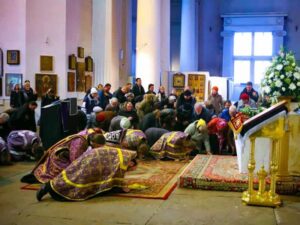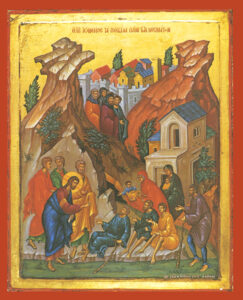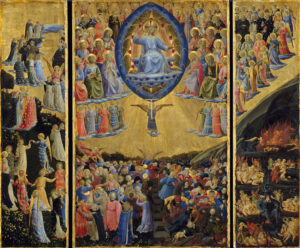
The Church edges us ever closer to the Great Fast.
This coming Sunday is Meatfare Sunday, the last day for meat till Pascha.
Here it is slipping away even now.
The following Sunday, March 6, is Cheesefare Sunday, the last day for meat byproducts, wine and oil and the like – for the day after that is Clean Monday, and The Great Fast begins.
Epistle for the Third Sunday of Pre-Lent: 1 Corinthians 8:8 – 9:2
We’re planning for the Fast. So why in the world did the Fathers select this Epistle for today? in which Saint Paul says “Food does not commend us to God”. That is, God isn’t impressed whether we eat or don’t eat. Why not an Epistle urging us to fast?
Because the Fathers were speaking to a society where almost everyone fasted – as has been true almost everywhere in the world, at almost every time, in almost every culture. in almost every religion – up until modern times in our Western culture, where most people think “religious” fasting is just silly.
 www.localfitness.com.au
www.localfitness.com.au
This is very odd. People today watch what they eat in order to attain good health or to lose weight. In recent times we have learned to think holistically and see the inter-connectedness of soul, mind and body. So why do so few people today fail to see the connection between spirituality and fasting or feasting? People exercise  their physicial muscles, but don’t see the point of exercising their spiritual muscles. That’s just the modern world: materialistic and very disjointed.
their physicial muscles, but don’t see the point of exercising their spiritual muscles. That’s just the modern world: materialistic and very disjointed.
www.pravmir.com
Anyway, the Fathers were aiming this Epistle at people who took fasting for granted and saw its value, as we Orthodox still do, and their purpose was to point out the dangers in fasting. For example, Paul says you can’t impress God by giving up meat. God is not going to say: “Oh, what a holy person! He didn’t eat that cheeseburger!”
In last Sunday’s Epistle Paul said all foods are permissible. Like Judaism before us, the Church has always said fasting is good for us and therefore gives us rules for fasting. As we pointed out last week, fasting is not a moral issue for us Orthodox. Fasting is just training in self discipline, using something which is at hand and convenient every day – food. The purpose is so that when we have to give up something immoral, we’ll have had practice in how to do it.
Paul says the only moral problem here would be if our fasting or not fasting might affect somebody else’s faith. For Christians, the real issue always is love, caring about people. We looked last week at one of the issues in the First Century Church: Should Christians eat meat that had previously been sacrificed to idols. Paul said: No problem. Eat it, because idols have no power.
 Lenten food (koriaste.org)
Lenten food (koriaste.org)
However, today he looks at the other side of the question: “Only take care lest this liberty of yours somehow become a stumbling block to the weak. For if any one sees you, a man of knowledge, at table in an idol’s temple, might he not be encouraged, if his conscience is weak, to eat food offered to idols? And so by your knowledge this weak man is destroyed, the brother for whom Christ died. Therefore, if food is a cause of my brother’s falling, I will never eat meat, lest I cause my brother to fall.”
Bring it up to date. What if someone who is sincerely seeking Orthodoxy comes across you in a restaurant wolfing down a steak during Lent? and he concludes “these Orthodox aren’t serious, they’re just playing games”. You see…? The issue is not food. The issue is people: How will it affect people?
Or take the opposite tack: You’re invited out to Western Easter dinner, and they serve you meat, and you say: “Oh, I can’t eat that. I’m Orthodox. I’m fasting!” – and your hosts conclude that Orthodox are self-righteous, prideful, ungrateful prigs. The issue is not food. The issue is people: How will it affect people?
 skete.com
skete.com
Once during Lent Saint Spyridon * had an unexpected visitor who had come a long way and was famished. Bishop Spyridon ate very little during the Fast, and the only food he had to offer him was some dried salted pork. The man refused it: it was Lent! So Saint Spyridon ate some of the pork first so his visitor would feel comfortable, and then the man ate. The issue is not food. The issue is people. How will it affect people?
- https://frbillsorthodoxblog.com/2019/12/06/156-saint-spyridon-a-much-traveled-saint/
May we go off on a slight tangent? Ultimately everything we do, whether small or great, affects others. There is no such thing as a private sin or a private virtue. John Donne, priest of the Church of England, wrote “No man is an island complete in itself. Each man is a  piece of the continent, a part of the whole. If a clod is washed away by the sea, Europe is the less. Each man’s death diminishes me, for I am involved in mankind. Therefore send not to know for whom the bell tolls. It tolls for thee.”
piece of the continent, a part of the whole. If a clod is washed away by the sea, Europe is the less. Each man’s death diminishes me, for I am involved in mankind. Therefore send not to know for whom the bell tolls. It tolls for thee.”
So if I don’t get vaccinated and refuse to wear a mask and expose others… Or if you drink and drive, or text and drive… Or if I don’t pray, or if I don’t forgive or don’t worship or don’t fast… The issue is people. How will it affect others? We’re all in this together, brothers and sisters.
Oh, why am I trying to say what Saint Paul has already said? “Now you are the Body of Christ, and each one of you is a part of it. If one member suffers, all the members suffer with it; or if one member is honored, all the members rejoice with it. Now you are the Body of Christ, and members individually.” I Corinthians 12: 26-27
But fasting is such a little thing, you say. Why do we Orthodox put so much emphasis on it?
1 Because Jesus assumed we would. In next Sunday’s Gospel He will begin “when you fast”, not if.
2 Because after He criticized the pharisees for fussing about fasting (they even tithed on cooking herbs!) but ignoring the great things (justice, mercy and faithfulness), He concluded “You ought to do the one without neglecting the other.” Matthew 23:23 Be merciful and just and faithful and keep the Fast.
3 He said “He who is faithful in what is least is faithful also in much”. Luke 16:10 Little things matter. We all know that. Three little words “I love you” can determine the course of a person’s life. If I didn’t take a bunch of little pills daily, I’d be out of commission.
by permission of Saint Isaac’s Skete at skete.com

4 The disciples asked Jesus why they couldn’t heal an epileptic boy. He answered “This kind can come out only by but prayer and fasting.” Mark 9:29 Prayer and fasting give power to drive out our “demons”.
But how exactly can such a little thing as fasting make such a big difference? Sorry, you don’t need to know that. I don’t understand how my computer stores all this information. I just looked it up, and I have no idea what they are talking about! yet here I am using my laptop. I don’t know how my meds work, but my neurologist who knows more than I do says they do – and they do, believe me.
Jesus the Great Physician told us to fast. His Church, with 2000 years’ experience shaping us human beings for the better, says fasting works. So...just do it! You want to be spiritually healthy? Take your medicine.
Holy Gospel for the Third Sunday of Pre-Lent: Matthew 25:31-46

Fra Angelico, c 1500
“When the Son of Man gathers all nations before Him, He will separate them as a shepherd separates the sheep from the goats”.
And the Last Judgment will have come.
Why does the Church have us think about the Last Judgment as we go into Lent? Because Lent is the time to get serious, to consider where our lives are headed, remembering that what we do now, day by day, will have eternal consequences.
Jesus Christ taught that in the End. there will be only two options: Heaven or hell. There is a Kingdom prepared for the sheep of His flock, abundant ever lasting life, fresh pastures, eternal spring, joy with the Lord and all who love Him – Heaven, shown above on Christ’s right. On Christ’s left is the place for the rebellious goats who will be told “Depart into the everlasting fire.”
 What is hell? Christ sometimes used the word “Gehenna”. The Valley of Gehenna was the garbage dump down below Jerusalem, from which smoke always rose, as the city’s refuse was burnt up. Hell is the eternal garbage heap for those who proved in their earthly lives to be not worth saving.
What is hell? Christ sometimes used the word “Gehenna”. The Valley of Gehenna was the garbage dump down below Jerusalem, from which smoke always rose, as the city’s refuse was burnt up. Hell is the eternal garbage heap for those who proved in their earthly lives to be not worth saving.
Someone said we must believe in hell because Christ taught it plainly, but we don’t have to believe anybody is in it! Indeed it is hard to imagine how in the End anyone could stand before Jesus Christ, look Him in the face, see His beauty, His love, His goodness, His mercy, His forgiveness – and reject Him. That is why Saint ![]() Gregory of Nyssa hoped that in the End everyone – even the devil and his angels – will be renewed and saved.
Gregory of Nyssa hoped that in the End everyone – even the devil and his angels – will be renewed and saved.
Pantocrator from Saint Katherine’s Monastery, Mount Sinai
I like that. However, I think Scriptural teaching is that while all could be saved, not all will be saved. Why not?
In his book The Great Divorce C S Lewis wrote: “There are only two kinds of people in the end: those who say to God, ‘Thy will be done,’ and those to whom God says, in the end, ‘Thy will be done.’ All that are in Hell, choose it. Without that self-choice there could be no Hell. No soul that seriously and constantly desires joy will ever miss it. Those who seek find. To those who knock it is opened.”
We are deciding now, and Jesus Christ,”standing” in Eternity, knows what we will choose. But He doesn’t force Himself on us. It will be our choice.
Would we rather that there be no judgment? Do we want things to go on as they are forever? where evil and evildoers so often are the “winners”, where good people often lose and suffer? Would we want to have no judgment on our lives, so that we could just drift on as we are forever? Thank God there will be judgment! “Come, Lord Jesus” and straighten things out.
Now comes the tough part. No, the easy part. By what standard will we be judged? Saint Basil the Great summed it up in the Anaphora of his Divine Liturgy (any here present who are of Protestant inclination may want to close your eyes for a moment): “…and He will come to render to each according to his works” That is Jesus Christ’s teaching in this Gospel reading – and in many other places.
The Judgment will not be on your “faith alone”. It will not be on whether you “got saved” or had a “born again” experience, or believed the right doctrines, or publicly gave your life to Jesus, or what church or what religion you belonged to, or even whether you belonged to any religion at all.
The standard of judgment will be Love. How did we treat people? “Inasmuch as you have done it to the least of these my brethren, you have done it to Me.” Why did I say that’s the “easy part”? Because it is so pleasant, so fulfilling, so lovely to love people. It gives us so much joy.
![]() courtesy of Saint John the Evangelist Orthodox Church, Beaver Falls, PA
courtesy of Saint John the Evangelist Orthodox Church, Beaver Falls, PA
Note carefully: Christ here described the judgment of the nations (ἔθνη), which includes nonbelievers. He says that in the End it will turn out there were many non-Christians who were serving Him, but just didn’t know it yet. But doesn’t salvation require belief in Christ? Yes, of course. “No one comes to the Father except by Me.” John 14:6. There are many who have never truly heard the Gospel, for whatever reason. For example, one unloving Christian or one immoral priest may have turned them away from Christianity, from Christ for all their lives. * That will all get straightened out in the End.
- Editorial comment: It is horrifying today to see probably the most prominent and visiblly Orthodox man in the world, president of a deeply Orthodox country, authorize war against the innocent people of another Orthodox country. I wonder: How many people will be turned away from Christianity, from Orthodoxy, from Christ because of this? See https://www.thenationalherald.com/patriarch-bartholomew-condemns-the-russian-invasion-in-ukraine/:

Kyiv, Feb 25, 2022 (Ukrainian Police Department photo)
In the End, all who have shown mercy, love, compassion will see Christ as He is, and will believe and love Him, and in they will go. “Enter into the Kingdom prepared for you from the foundation of the world…”
But there will be others, even those who were formally Christians, who were not serving Him – because no matter how many times they said the Creed, how could they possibly have been following Jesus and then have treated people like that?
That is why, in the End, “many who were first shall be last, and the last first.” Wherever you and I wind up, we may be very surprised to see who is there with us!
Who are the sick, the lonely, the poor, the hungry, the helpless, the hopeless, the refugees, the abandoned ones – so many needy people with so many kinds of needs? Certainly the ones “over there”: the starving, the innocent victims of war. (Please contribute to International Orthodox Christian Charities.) There are also needy people near us: wives, husbands, children, family, friends, co-workers, even bosses, clergy, our bishops. Sometimes it’s the ones closest to us that we miss. Perhaps all they need is a smile or a kind word or that we just listen to them. What’s asked of us is often not difficult.
So during Great Lent, form the habit of looking around you and see who are in need. Will you choose now to help them, as best you can? Or will you choose now to ignore them?
Remember: The time will come when you will have chosen.
Next Week: Last Sunday of Pre-Lent: Cheesefare Sunday: Forgiveness Sunday
Week after Next: First Sunday of Great Lent